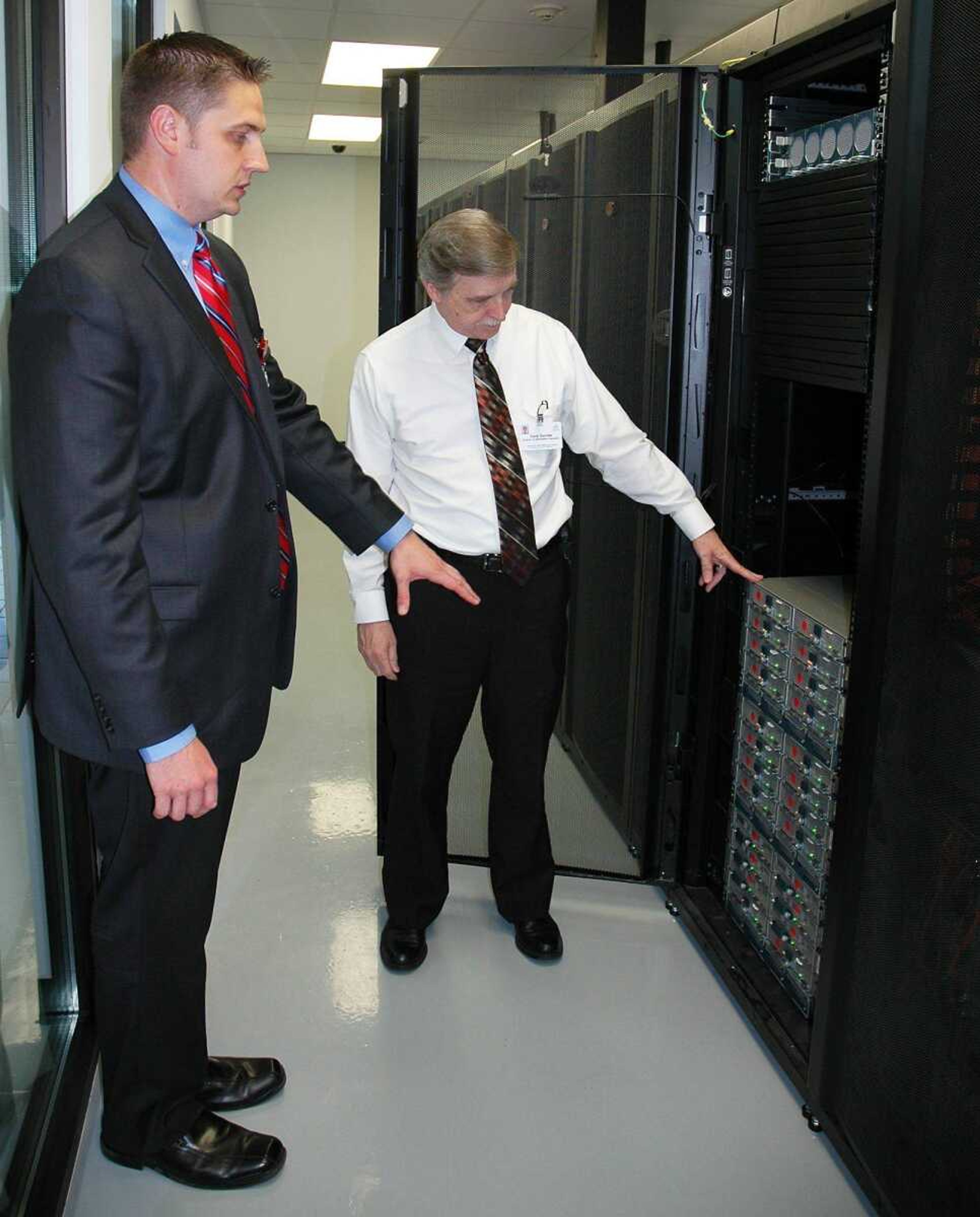Hospitals join forces to manage medical records
Two hospitals that once viewed each other as competition have come together to meet new federal mandates for electronic medical records. SoutheastHEALTH and Missouri Delta Medical Center in Sikeston, Mo., formed a new company, Servir, to build and manage a common networking and data storage center for both organizations. They're currently seeking other medical providers to partner with them for data storage as well...
Two hospitals that once viewed each other as competition have come together to meet new federal mandates for electronic medical records.
SoutheastHEALTH and Missouri Delta Medical Center in Sikeston, Mo., formed a new company, Servir, to build and manage a common networking and data storage center for both organizations. They're currently seeking other medical providers to partner with them for data storage as well.
The new $3.5 million facility off Silver Springs Road in Cape Girardeau includes a 2,000-square-foot electronic data storage area and training rooms. Its data storage is equivalent to 250,000 CDs.
Over the next year, both hospitals will install a $12 million health information software system called Soarian, said Mike Dozier, regional information officer for SoutheastHEALTH. A fiber-optic cable also now connects Southeast's facilities in Cape Girardeau to the data center and to Missouri Delta Medical Center. Southeast Health Center of Ripley County, formerly Ripley County Memorial Hospital, will convert to the new system in about a year.
The Centers for Disease Control and Prevention estimates up to $27 billion will be spent over 10 years to adopt electronic medical records. Congress set aside $19 billion to assist medical providers with the conversion in the American Recovery and Reinvestment Act of 2009.
The Servir project will receive about $10 million in funding from the federal government. The health care reform law passed in 2010 imposes penalties beginning in 2015 for providers that do not move to electronic records.
"We knew our system wasn't going to get us to where we needed to be," said Jason Schrumpf, president of Missouri Delta Medical Center.
Both hospitals had been investigating new medical records systems independently before partnering in an effort to make the technology more affordable.
"The goal is to improve quality, reduce health care costs and provide a comprehensive system of care through the use of technology," Dozier said.
Physicians will be able to access medical records and test results through secure portals from any computer or smartphone.
For example, if a patient is seen at the emergency room at Missouri Delta and then transferred to SoutheastHEALTH for surgery, the physician can access the patient's record as they're being transported to the hospital, said Gary Gaines, director of information services at Missouri Delta.
Beginning this summer, all SoutheastHEALTH employees will have email access and be able to sign on to the computer system with a tap of their badge. There are about 2,300 computers to be upgraded at SoutheastHEALTH and about 600 at Missouri Delta, Dozier said. The system is already in place at many of SoutheastHEALTH's physician offices. The conversion at both hospitals should be completed by December, Dozier said.
Over the next two years the hospital will roll out a new video phone system, allowing for telemedicine applications.
Instead of patients driving two hours for a 20 minute doctor visit, high-definition video cameras, electronic stethoscopes and other high-tech monitoring devices will allow patients and doctors to video conference for follow-up visits, Dozier said.
Hospital officials have visited and studied telemedicine programs currently being used in St. Louis and Kansas City, Mo.
"Consumers like it because they don't have to drive," said Jim Limbaugh, executive vice president of planning and business development at SoutheastHEALTH. "They are very comfortable with having a monitor in front of them now days compared to in the past."
Telemedicine could allow specialty services to be provided in rural markets without specialists having to spend their time traveling to and from locations, Limbaugh said.
Other technology possibilities include having text messages sent to nurses when a patient's call light goes on and medicine bottles with electronic caps that send an email to doctors offices when the bottle isn't opened for a patient to take their medicine, Dozier said.
"That kind of stuff is actually coming," Dozier said.
mmiller@semissourian.com
388-3646
Pertinent address:
623 S. Silver Springs Road, Cape Girardeau, MO
Connect with the Southeast Missourian Newsroom:
For corrections to this story or other insights for the editor, click here. To submit a letter to the editor, click here. To learn about the Southeast Missourian’s AI Policy, click here.









